
College of Media and Communication
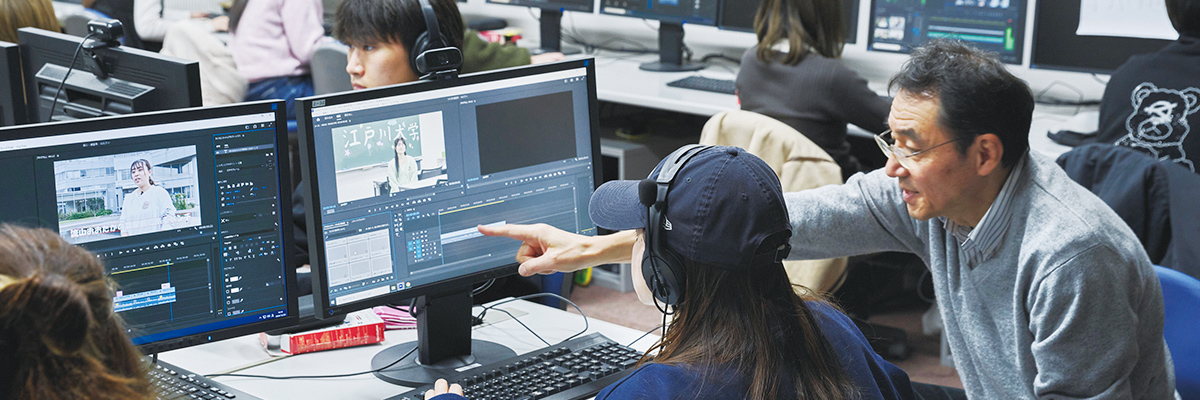
Learn about mass media based on media studies and communication theory, then acquire practical skills related to each medium in subjects offered as seminars and practicums developed based around 14 themes. Each theme is linked to one of four courses—the Creative Video Course, the Entertainment Course, the Journalism Course, and the Communication Business Course—allowing students to develop diverse perspectives through cross-disciplinary studies starting from their first year. In the third year, students select a seminar and work on individual research themes. Professors with field experience in television, newspapers, magazines, film, advertising, public relations, PR, events, marketing, and other industries support learning through a curriculum that offers hands-on experience in mass media.
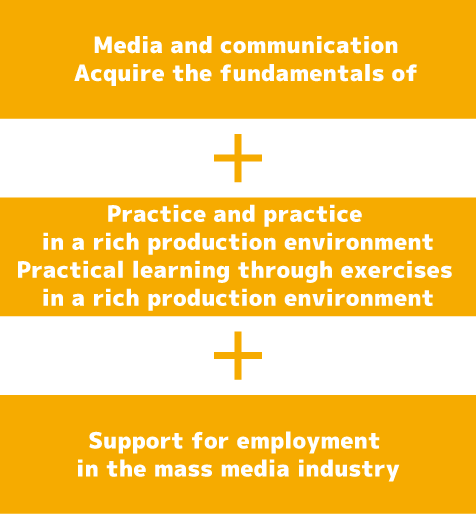
POINT 1
Communication Skills
Develop, Expand, and Polish!
Communication skills to build better relationships with others is an important skill for being active in the real world.
We will develop your strengths, expand your potential, and brush up your skills for the future.
POINT 2
Acquire the ability to gather, understand, and transmit information.
We cultivate the ability to collect and utilize important, necessary, and valuable information from the constant flow of information in today's society, as well as the ability to transmit information from an original perspective.
POINT 3
Top-level production environment and
Professors with extensive industry experience.
Practical opportunities abound, including hands-on training in full-scale studios and using the latest equipment, as well as extracurricular activities on TV, radio, and at events.
We offer realistic lectures based on our extensive experience in the mass media industry.
Qualifications and Licenses
Curator / Social welfare supervisor qualification / Junior high school teacher's license (Japanese language /social studies) / High school teacher's license (Japanese language /civics) / Social researcher
IT Passport Exam / Microsoft Office Specialist / TOEFL® / TOEIC® / Practical English Proficiency Test / PR Planner Test / Event Test / News Current Ability Test
Future career paths
【Mass Communication, Entertainment and Animation】Announcer / Talent Manager / Film Director / Screenwriter / TV Producer / TV Director / Broadcast Writer / Broadcast Reporter / Movie Camera Crew / Lighting Engineer / Sound Engineer / Commercial Planner / Radio Producer / Radio Director / Writer / Copywriter / Newspaper Reporter/Magazine Reporter/Journalist/Magazine and Book Editor/Advertising Planner/Advertising Designer/DTP Operator/DTP Director/DTP Designer/Manga Editor/Animation Production/Video Production/Comedian【Design and Photo】Photographer/Editorial Designer 【Event】Event Staff/Event Planner/Event Producer 【Sports】Sports Journalist/Sports Writer/Sports Magazine Editor 【School】Junior High School Teacher (Japanese, Social Studies)/High School Teacher (Japanese, Civics)/School Staff 【Information and Communication Industry, Wholesale and Retail Industry, Service industry, etc.】 Engineer/Professional Job/Marketer/Product Developer/PR etc.
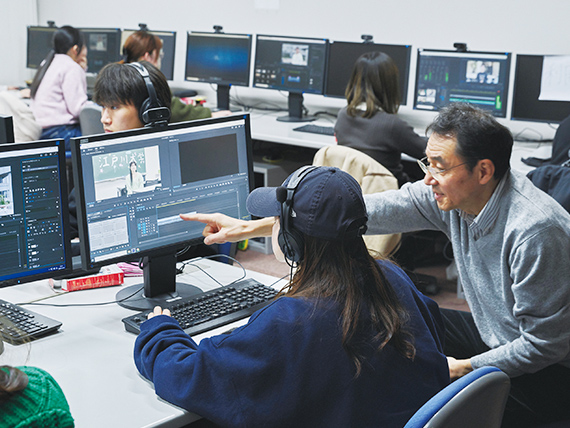
Students will learn the knowledge and skills necessary for planning and producing films, dramas, commercials, and other visual art works through analysis and research based on academic perspectives and through practical production of works.

The entertainment industry and its diverse contents are viewed academically and their characteristics are studied.
This is a study to shift from “receiver” to “creator” by learning theory and repeating practice.
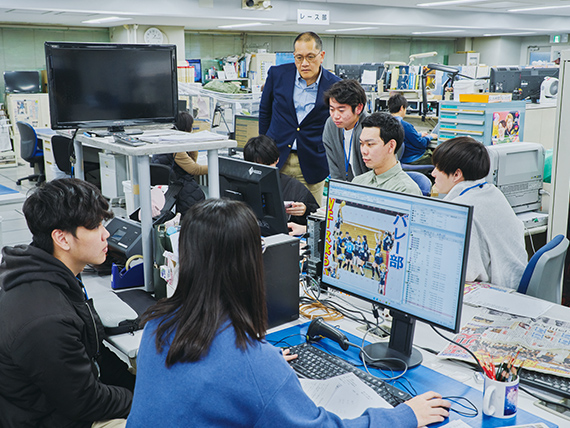
"Journalism" conveys the world through media to society. Students learn about their roles and tasks. You can also learn skills to convey through text, movies, and audio.
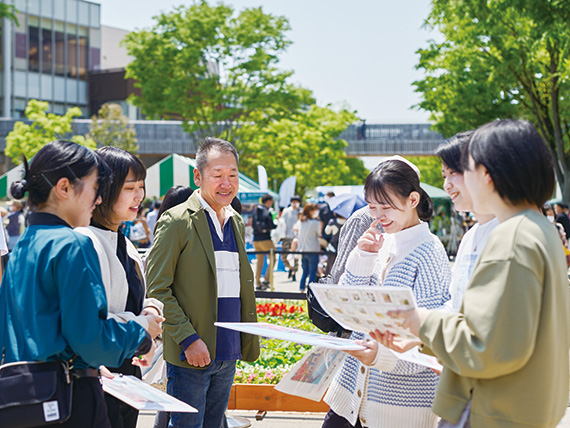
Students deepen their understanding of various communication methods such as advertising, public relations, PR, and events. You will get knowledge and skills for business.
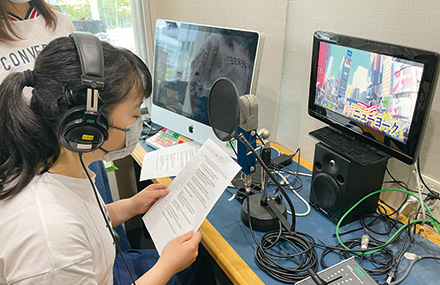
Learn a broad range of practical skills across different fields. Classes are led by instructors with extensive experience in their respective industries and fields. For example, students will do everything from market research to planning and making presentations to communicate their ideas and make them a reality. They may also create original works based on plans discussed in teams. Experience the excitement and challenges of turning a vision into concrete ideas and creations. Students learn in stages from their first to third years, acquiring increasingly advanced knowledge and skills.
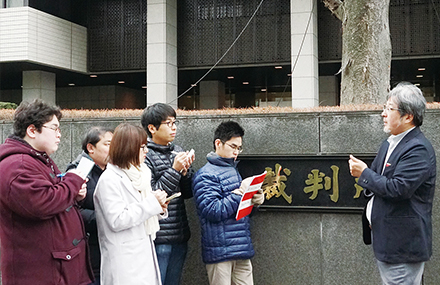
Build on the practice from other seminars and practicums to engage in even more specialized learning, creation, and research. Choose a Specialized Seminar based on your personal interests and intended post-graduation career path. Receive guidance from instructors as you explore themes for your research and work. In Graduation Research during your fourth year, you will build on previous learning as you perform research, culminating in a thesis.
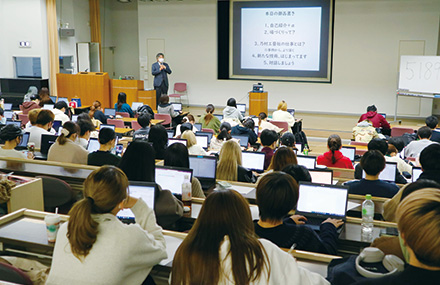
Gain a deeper understanding of work in the media industry as you contemplate your future and career path.
Lectures also feature guest speakers from different industries. Professionals working in television, newspapers, radio, advertising, promotions, PR, and events provide lectures on the realities of the industry and the type of talent sought.
Edogawa University also conducts small class sessions to prepare students for work in the media and other industries with aptitude testing (SPI) preparation, interview practice, and more.
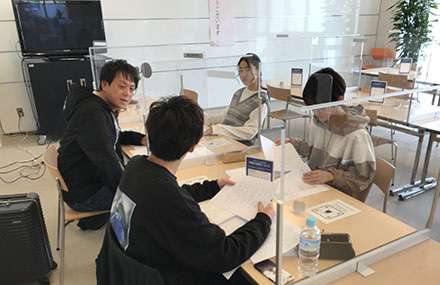
These are study groups to help pass job placement exams in the media sector. Instructors with proven track records in the media will guide students who are serious about a career in newspaper, publishing, television, advertising, events, and more.
In addition to working on current affairs, essays, improving planning skills, and preparing for interviews, there is practical training for aspiring announcers as well as broadcasts of the university’s own FM program.